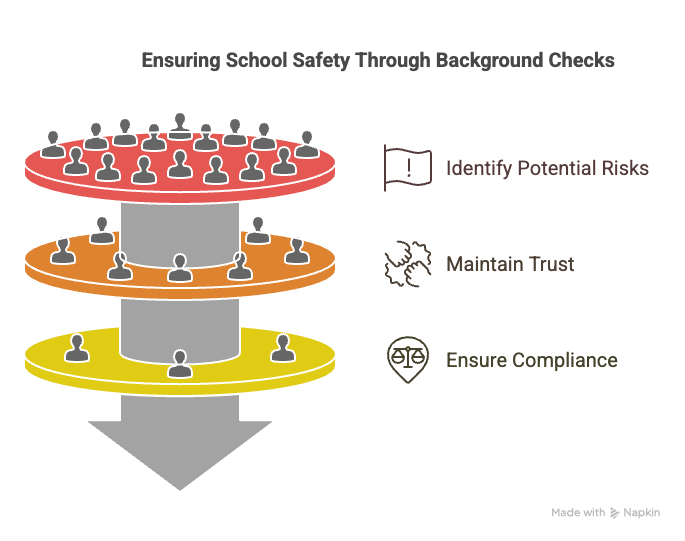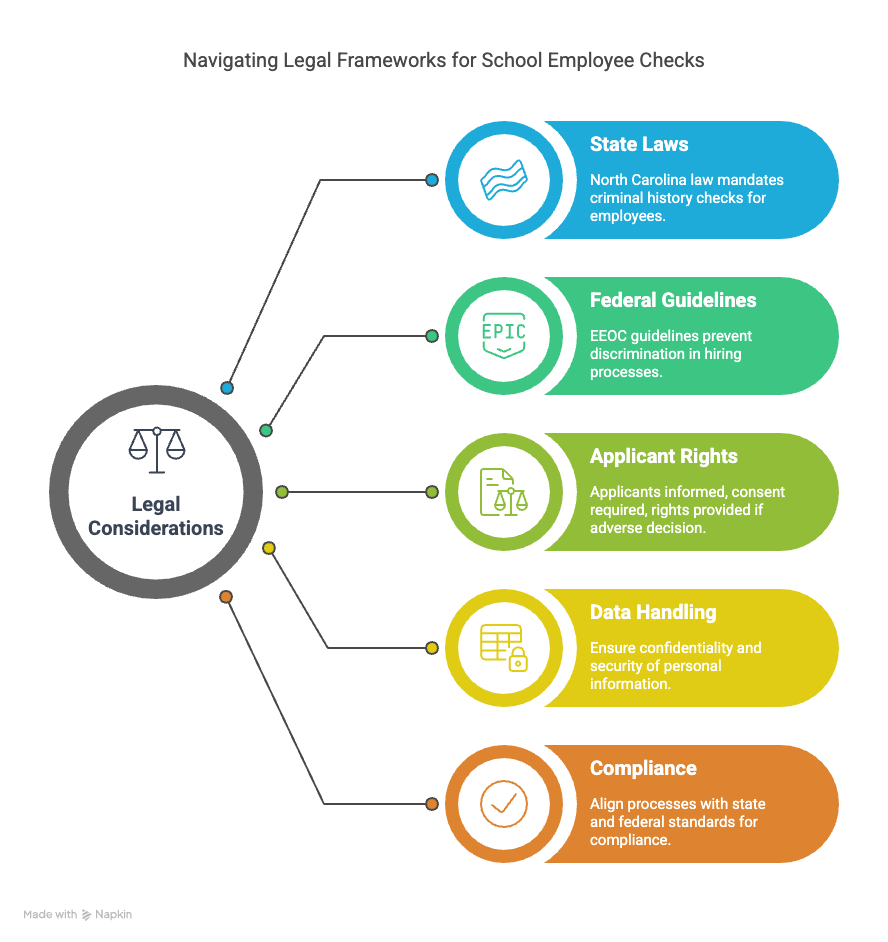Navigating the ins and outs of background checks in North Carolina's educational realm can feel like traversing a complex maze. With the safety and well-being of students at stake, it's no wonder that the rules and regulations around hiring school employees and volunteers are stringent. This guide will simplify these complexities, providing a clear and detailed roadmap of the background check requirements for school employees, teachers, and volunteers within the state.
We'll dive into the necessity of these checks, the specific procedures involved, and the legal frameworks schools must adhere to. For educators and aspiring school volunteers, this guide will help clarify what to expect, while school administrators will gain insight into maintaining compliance.
Key Takeaways
- Background checks in North Carolina schools are crucial for ensuring student safety and maintaining community trust.
- These checks include criminal records, past employment, and educational qualifications to meet safety and integrity standards.
- Fingerprinting is an essential method for identifying potential risks associated with teacher hires.
- The Child Abuse Registry is a critical tool for protecting students from individuals with histories of abuse.
- Thorough screening of school volunteers is as necessary as for paid staff to ensure a safe school environment.
Introduction
Ensuring the safety of students in schools hinges on thorough background checks, a fundamental practice in maintaining this security. In North Carolina, these checks are not just a formality but a legal requirement aimed at safeguarding the classroom environment. They serve as a backbone in creating trust among parents, school staff, and the broader community.
Background checks in the North Carolina education sector cover a spectrum of verifications. These include criminal records, verifying past employment, and confirming educational qualifications. The objective is simple—ensure that anyone interacting with students, be it as teachers, volunteers, or other school employees, meets the integrity and reliability standards expected in educational settings.
This guide aims to demystify the labyrinthine legal processes and requirements related to background checks for school employees in North Carolina. Whether you are a school administrator tasked with compliance or an aspiring volunteer eager to contribute, understanding these requirements is crucial. Consider this resource a comprehensive overview of the laws and processes you must navigate.
Why Background Checks Are Crucial in Schools
Ensuring the safety of students is the backbone of any educational institution. Background checks act as the first line of defense in creating secure environments. When you know who's interacting with your students, you're in a better position to prevent potentially harmful situations. For parents, a thorough screening process means peace of mind, knowing that their children are safe at school.

Trust is another major pillar in schools. The relationship between parents, students, and staff rests on confidence in the institution's integrity. Conducting detailed background checks helps maintain this trust. Knowing that faculty and volunteers have been thoroughly vetted assures everyone involved that the school is a safe place.
Compliance with state and federal regulations isn't optional; it's mandatory. Failure to comply can lead to serious legal issues, including lawsuits or loss of funding, which can cripple a school’s operations. Familiarizing yourself with these regulations helps in effectively managing the background check process. So why risk it? Staying informed and compliant safeguards both the educational and legal standing of your institution.
North Carolina School Background Checks
When it comes to background checks in North Carolina schools, you're looking at a comprehensive process. These checks dig into several areas to ensure the safety and integrity of the educational environment. They typically involve criminal records, past employment, and educational verification. This means that anyone working or volunteering in schools undergoes a detailed examination of their history.
The legal requirements are specific. In North Carolina, regulations stipulate that these background checks must comply with both state and federal laws. The Equal Employment Opportunity Commission (EEOC) guidelines play a role here, ensuring that the process is fair and nondiscriminatory. For more detailed information, schools often refer to resources such as the EEOC Guidelines.
Who handles these checks? School districts and private educational institutions are primarily responsible. It's their job to make sure the checks are done correctly and in a timely manner. This involves coordinating with law enforcement for criminal background checks and verifying prior employment and education credentials.
Ensuring compliance with the law isn't just about ticking boxes. It helps build trust within the community and assures parents that those who interact with their children meet the highest standards of safety and ethics. What steps does your institution take to uphold these standards? Consider evaluating your current practices to ensure they align with these requirements.
NC Teacher Fingerprinting
Fingerprinting plays a fundamental role in the screening process for teachers in North Carolina. It's a primary tool used to uncover any criminal history that might not be visible through other background check methods. Schools use fingerprinting to ensure that anyone involved in teaching has a clean record, helping to maintain a safe environment.
The process begins with the candidate visiting a designated agency for fingerprint collection. This might be a local police department or a third-party service provider authorized by the state. The fingerprints are then matched against state and federal criminal databases. This match helps identify any criminal activity that may disqualify a candidate from employment.
Several bodies collaborate to ensure the effectiveness of this system. School districts partner with the North Carolina Department of Public Safety and the Federal Bureau of Investigation to get detailed reports. This partnership allows schools to receive the most current and comprehensive criminal history data. The goal is to evaluate potential risks before making hiring decisions.
Legal guidelines are clear and specific about what schools must do. North Carolina law mandates fingerprinting for all new teachers and those pursuing certification. The state has laid out strict policies to ensure the confidentiality and proper use of fingerprint data. Misuse of this data is taken seriously and has legal consequences.
When considering the inclusion of a fingerprinting process in your hiring practices, it's essential to comply with these legal requirements. Following these guidelines not only helps in legal compliance but also contributes to greater school safety.
Is your school district using the full scope of fingerprinting to screen potential teachers effectively? Proper implementation not only ensures safety but also builds trust among parents and community members.
Child Abuse Registry NC
Every child's safety is non-negotiable. North Carolina's Child Abuse Registry plays a crucial role in protecting young students by ensuring that individuals who have harmed children in the past are identified before they're allowed near schools. This registry serves as a vital checkpoint for school administrators during hiring.
Accessing the registry is streamlined for authorized entities like school districts. Administrators submit requests through a formal process, often integrated into broader background checks. Doing so checks potential hires and volunteers for any registered incidents of abuse or neglect. This step is indispensable in safeguarding students and maintaining the trust of their families.
If a prospective employee is listed in the registry, it raises immediate concerns about their suitability for roles involving children. Schools often adopt a zero-tolerance stance toward any record in the registry, unequivocally prioritizing student welfare. The presence on this list can make employment within educational settings virtually unattainable in North Carolina.
School districts can enhance protection by integrating regular checks of this registry into their routine background processes, ensuring that their staff remains qualified and trusted. Are your hiring protocols inclusive of all necessary safeguards, like this crucial registry check?
School Volunteer Screening
You might think background checks are just for paid employees, but volunteers play a crucial role in schools. Even though they are unpaid, volunteers often have direct or indirect contact with students, making their screening just as important. This ensures a safe environment for everyone involved.
Volunteers undergo a structured screening process to protect students. It typically begins with an application form, where potential volunteers provide personal details, consent to background checks, and submit references. Schools then perform checks similar to those for employees, including criminal history and references. The effort might seem excessive, but it ensures the safety of the school community. Volunteer screenings also often include interviews or meetings to assess suitability.
Effective volunteer screening focuses on both thoroughness and respect for privacy. Schools can streamline this by having a dedicated team or a third-party service handle background checks. It's sensible to inform volunteers clearly what the screening entails and assure them of confidentiality. This transparency encourages trust and a positive volunteer experience.
Have you considered how volunteer screenings can protect students and enhance a positive school culture? Implementing robust procedures is essential, but balancing thoroughness with volunteer engagement can optimize both safety and community involvement.
Legal Considerations
When conducting background checks for school employees in North Carolina, understanding the legal framework is essential. State laws dictate several elements of these checks. For instance, North Carolina law requires that all public school employees undergo criminal history checks. This includes a review of any felony or misdemeanor charges, with a focus on offenses that may pose a risk in a school setting.
Federal guidelines, such as those provided by the Equal Employment Opportunity Commission (EEOC), play a role too. These guidelines emphasize preventing discrimination based on race, color, national origin, sex, religion, disability, or age in the hiring process. They require that the information gathered in background checks be relevant to the job positions.
Applicants have rights in this process as well. You must inform them of the check beforehand and obtain their written consent. If the check leads to an adverse employment decision, you are obligated to provide the applicant with a copy of the report and a "Summary of Rights" under the Fair Credit Reporting Act. This transparency allows candidates to dispute any inaccuracies.

Handling of personal information is another critical aspect. Ensuring the confidentiality and security of the data collected is not just a legal requirement but also a best practice for maintaining trust. Are your systems robust enough to protect sensitive information?
Staying compliant can be a challenge, but it’s crucial for avoiding legal pitfalls. Are you aligning your processes with both state and federal standards? Taking these legal considerations seriously will safeguard your school environment and provide fair opportunities for all candidates.
Practical Tips for Schools
Starting with a clear background check system is essential. Your approach should include defining the screening process for different roles. Create specific checklists for teachers, staff, and volunteers. Consider differences in scope—for instance, a teacher may require a more extensive criminal background check than a volunteer.
Training is crucial. School administrators need to know how to conduct these checks legally and efficiently. Arrange regular training sessions for those involved in hiring. This ensures they are up-to-date with state laws and federal guidelines.
Continuous monitoring is often overlooked but critical. Background checks should not be a one-time event. Implement a system to re-check employees at regular intervals. This can help you identify new issues and maintain a safe environment for students.
Each step of your process should respect both efficiency and privacy. Use a secure digital system to store sensitive information, and ensure access is limited to those who need to know.
By integrating these tips, your school can maintain compliance and foster a safe educational environment for all.
Conclusion
Background checks in North Carolina schools are essential safeguards. They're mandatory for fostering student safety, maintaining trust, and complying with regulations. By understanding the importance of criminal records, educational verification, and employment histories, schools can better protect their communities. Fingerprinting and the child abuse registry play crucial roles. Volunteers require thorough screening just like employees. School administrators must ensure due diligence in these processes.
Expect to see more technological integration in background checks. Automated systems and databases will streamline processes, offering quicker, more efficient verifications. Stay informed about legislative updates that could affect requirements.
School leaders and administrators must prioritize comprehensive background checks. These efforts are crucial to maintain a secure and trustworthy educational space. Regularly review and improve your systems, and ensure that all personnel involved are trained in these vital practices. Your commitment to these checks upholds the integrity and safety of your institution.
Frequently Asked Questions (FAQs)
What disqualifies you from working in NC schools?
Certain criminal convictions can disqualify you, including those related to violence, sex offenses, and drug-related crimes. Each case is evaluated individually.
How long do NC school background checks take?
Background checks typically take between two to four weeks.
Are substitute teachers required to be fingerprinted in NC?
Yes, substitute teachers must undergo fingerprinting.
Can a DUI affect school employment in NC?
Yes, a DUI can affect employment decisions. It depends on the circumstances and the school district's policies.
How to appeal a denied school clearance in NC?
You can contact the school district or the Department of Public Instruction to inquire about the appeals process.
Do NC private schools follow the same rules?
Private schools may have their own policies, but many follow similar guidelines for background checks.
Are expunged records visible to NC schools?
No, expunged records are not visible during background checks.
What’s the cost of school fingerprinting in NC?
Fingerprinting fees are generally around $10 to $15, but this can vary by district.
Do NC school volunteers need background checks?
Yes, background checks are required for volunteers in most districts.
How often must school employees renew checks?
Background checks are typically updated every five years, but this can vary by district.
What documentation is needed for a school background check in NC?
You'll need to provide identification and any relevant personal information.
Can past employment in another state affect clearance in NC schools?
Yes, past employment records from other states may be reviewed.
Is there a difference in background checks for teaching vs. non-teaching positions?
Yes, teaching positions may require more detailed checks due to the nature of the job.
What agencies conduct the background checks for NC schools?
Background checks are usually conducted by both local school districts and state agencies.
Definitions
Background Check
A background check is a process employers use to review a candidate's personal, professional, and criminal history. Schools in North Carolina conduct these checks to confirm employment history, educational qualifications, and criminal records. This helps ensure that individuals working with students meet safety and ethical standards.
Criminal History Check
This is a review of an individual's criminal record, including any arrests, charges, or convictions. In North Carolina schools, this check is mandatory for all staff and plays a key role in determining if someone poses a potential risk to students. For example, a felony conviction may disqualify someone from working in education.
Fingerprinting
Fingerprinting involves collecting a person’s fingerprints and sending them to law enforcement agencies for criminal history checks. In North Carolina, teachers and staff are fingerprinted to match their records against state and federal databases. This step helps uncover offenses that other background checks might miss.
School Volunteer Screening
This refers to the vetting process schools use before allowing individuals to volunteer. It includes a background check, reference checks, and sometimes an interview. Even though volunteers aren't paid, they often interact with students, so schools use these screenings to help maintain a safe environment.
Equal Employment Opportunity Commission (EEOC)
The EEOC is a federal agency that enforces employment laws against discrimination. When schools run background checks, they must follow EEOC guidelines to ensure they don’t unfairly exclude candidates based on race, sex, disability, or other protected categories. This helps maintain legal and fair hiring practices.

GCheck Editorial Team
Meet the GCheck Editorial Team, your trusted source for insightful and up-to-date information in the world of employment background checks. Committed to delivering the latest trends, best practices, and industry insights, our team is dedicated to keeping you informed.
With a passion for ensuring accuracy, compliance, and efficiency in background screening, we are your go-to experts in the field. Stay tuned for our comprehensive articles, guides, and analysis, designed to empower businesses and individuals with the knowledge they need to make informed decisions.
At GCheck, we're here to guide you through the complexities of background checks, every step of the way.





